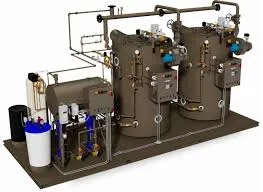
Dec . 16, 2024 16:55 Back to list
thermal oil boiler vs steam boiler
Thermal Oil Boiler vs. Steam Boiler A Comprehensive Comparison
In industrial applications, maintaining optimal temperatures and heats is vital for efficiency and safety. Two popular types of boilers used to achieve consistent heating are thermal oil boilers and steam boilers. Although both systems serve the purpose of delivering heat, they operate differently and are suited for different applications. This article will provide a detailed comparison of thermal oil boilers and steam boilers, helping you decide which is better for your specific needs.
Operating Principles
Thermal Oil Boilers
Thermal oil boilers operate by heating a special thermal oil that circulates through a system of pipes, indirectly transferring heat to the desired process or application. The boiler heats the thermal oil through combustion (typically using natural gas, diesel, or biomass). Once the thermal oil reaches the desired temperature, it can transfer heat to various equipment, processes, or spaces requiring heat.
Steam Boilers
On the other hand, steam boilers work by heating water to generate steam. The steam created can be used directly for heating or power generation, or further processed to deliver heat to various applications. Steam boilers can be classified into two main types fire-tube boilers and water-tube boilers, both of which utilize the principle of steam generation through the heating of water.
Efficiency and Temperature Control
One of the most significant differences between thermal oil and steam boilers lies in their temperature control and efficiency.
Thermal Oil Boilers
Thermal oil systems can achieve very high temperatures—often exceeding 300°C (572°F)—without the necessity for high pressure. This makes them suitable for processes that require stable and precise temperature control over a wide range. Furthermore, thermal oil boilers operate at lower pressures, which reduces the risk of equipment failure or accidents, leading to safer operations.
Steam Boilers
thermal oil boiler vs steam boiler

Steam boilers typically produce steam at pressures that can vary widely, enabling them to reach high temperatures as well, but often with the inherent risk of pressure-related issues. Efficient steam heating systems often require additional components, such as blow-off valves and safety mechanisms, to manage pressure safely. Although steam boilers can achieve high temperatures, the complexity of maintaining optimal pressure and temperature relationships can make them less efficient in some applications compared to thermal oil boilers.
Applications
The choice between thermal oil and steam boilers largely depends on the specific application.
Thermal Oil Boilers
Due to their ability to deliver high temperatures consistently and their flexibility in maintaining temperature control, thermal oil boilers are commonly used in industries such as chemical processing, oil refineries, food production, and plastics manufacturing. They excel in applications where precise temperature control and high thermal efficiency are required.
Steam Boilers
Steam boilers, with their higher steam pressures and versatility, are broadly used in industries such as power generation, agriculture, and heating systems in large buildings. They are also beneficial for applications requiring steam for sterilization, humidification, or other processes.
Maintenance and Operational Costs
When considering operational costs and maintenance, thermal oil boilers tend to require less frequent maintenance than steam boilers. The lower operating pressure translates to less stress on the equipment, leading to a longer lifespan and reduced risk of operational downtime.
However, the thermal oil itself can degrade over time, necessitating regular testing and potential oil replacement. Steam boilers, while potentially requiring more maintenance due to their complex systems and pressure-related components, might present lower initial costs but can incur higher operational expenses through frequent shutdowns and maintenance.
Conclusion
Both thermal oil and steam boilers have their unique advantages and disadvantages, making them suited for different industrial applications. When deciding between the two, consider the specific requirements of your operations temperature and pressure requirements, efficiency needs, safety factors, and maintenance capabilities. By understanding the distinctions and operational characteristics of thermal oil boilers and steam boilers, you can make a well-informed decision to best meet your business objectives. Ultimately, whether you choose a thermal oil boiler or a steam boiler, the goal remains the same—ensuring efficiency, safety, and reliability in your heating applications.
-
High-Efficiency Commercial Oil Fired Steam Boiler for Industry
NewsJul.30,2025
-
High-Efficiency Biomass Fired Thermal Oil Boiler Solutions
NewsJul.30,2025
-
High Efficiency Gas Fired Thermal Oil Boiler for Industrial Heating
NewsJul.29,2025
-
High-Efficiency Gas Fired Hot Water Boiler for Sale – Reliable & Affordable
NewsJul.29,2025
-
High Efficiency Biomass Fired Hot Water Boiler for Industrial and Commercial Use
NewsJul.29,2025
-
High-Efficiency Biomass Fired Hot Water Boiler for Industrial Use
NewsJul.28,2025
Related PRODUCTS






















